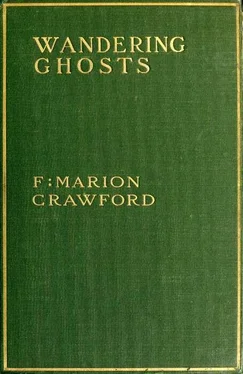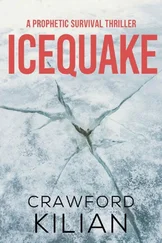F. Crawford - Wandering Ghosts
Здесь есть возможность читать онлайн «F. Crawford - Wandering Ghosts» весь текст электронной книги совершенно бесплатно (целиком полную версию без сокращений). В некоторых случаях можно слушать аудио, скачать через торрент в формате fb2 и присутствует краткое содержание. Год выпуска: 2012, Жанр: Ужасы и Мистика, на английском языке. Описание произведения, (предисловие) а так же отзывы посетителей доступны на портале библиотеки ЛибКат.
- Название:Wandering Ghosts
- Автор:
- Жанр:
- Год:2012
- ISBN:нет данных
- Рейтинг книги:3 / 5. Голосов: 1
-
Избранное:Добавить в избранное
- Отзывы:
-
Ваша оценка:
- 60
- 1
- 2
- 3
- 4
- 5
Wandering Ghosts: краткое содержание, описание и аннотация
Предлагаем к чтению аннотацию, описание, краткое содержание или предисловие (зависит от того, что написал сам автор книги «Wandering Ghosts»). Если вы не нашли необходимую информацию о книге — напишите в комментариях, мы постараемся отыскать её.
Wandering Ghosts — читать онлайн бесплатно полную книгу (весь текст) целиком
Ниже представлен текст книги, разбитый по страницам. Система сохранения места последней прочитанной страницы, позволяет с удобством читать онлайн бесплатно книгу «Wandering Ghosts», без необходимости каждый раз заново искать на чём Вы остановились. Поставьте закладку, и сможете в любой момент перейти на страницу, на которой закончили чтение.
Интервал:
Закладка:
There's not much more to tell about the Helen B. Jackson , so far as I am concerned. We were more like a shipload of lunatics than anything else when we ran in under Morro Castle and anchored in Havana. The cook had brain fever, and was raving mad in his delirium; and the rest of the men weren't far from the same state. The last three or four days had been awful, and we had been as near to having a mutiny on board as I ever want to be. The men didn't want to hurt anybody; but they wanted to get away out of that ship, if they had to swim for it; to get away from that whistling, from that dead shipmate who had come back, and who filled the ship with his unseen self! I know that if the Old Man and I hadn't kept a sharp lookout, the men would have put a boat over quietly on one of those calm nights, and pulled away, leaving the captain and me and the mad cook to work the schooner into harbour. We should have done it somehow, of course, for we hadn't far to run if we could get a breeze; and once or twice I found myself wishing that the crew were really gone, for the awful state of fright in which they lived was beginning to work on me too. You see I partly believed and partly didn't; but, anyhow, I didn't mean to let the thing get the better of me, whatever it was. I turned crusty, too, and kept the men at work on all sorts of jobs, and drove them to it until they wished I was overboard, too. It wasn't that the Old Man and I were trying to drive them to desert without their pay, as I am sorry to say a good many skippers and mates do, even now. Captain Hackstaff was as straight as a string, and I didn't mean those poor fellows should be cheated out of a single cent; and I didn't blame them for wanting to leave the ship, but it seemed to me that the only chance to keep everybody sane through those last days was to work the men till they dropped. When they were dead tired they slept a little, and forgot the thing until they had to tumble up on deck and face it again. That was a good many years ago. Do you believe that I can't hear "Nancy Lee" now, without feeling cold down my back? For I heard it, too, now and then, after the man had explained why he was always looking over his shoulder. Perhaps it was imagination. I don't know. When I look back it seems to me that I only remember a long fight against something I couldn't see, against an appalling presence, against something worse than cholera or Yellow Jack or the plague—and, goodness knows, the mildest of them is bad enough when it breaks out at sea. The men got as white as chalk, and wouldn't go about decks alone at night, no matter what I said to them. With the cook raving in his bunk, the forecastle would have been a perfect hell, and there wasn't a spare cabin on board. There never is on a fore-and-after. So I put him into mine, and he was more quiet there, and at last fell into a sort of stupor as if he were going to die. I don't know what became of him, for we put him ashore alive and left him in the hospital.
The men came aft in a body, quiet enough, and asked the captain if he wouldn't pay them off, and let them go ashore. Some men wouldn't have done it, for they had shipped for the voyage, and had signed articles. But the captain knew that when sailors get an idea into their heads, they're no better than children; and if he forced them to stay aboard, he wouldn't get much work out of them, and couldn't rely on them in a difficulty. So he paid them off, and let them go. When they had gone forward to get their kits, he asked me whether I wanted to go, too, and for a minute I had a sort of weak feeling that I might just as well. But I didn't, and he was a good friend to me afterwards. Perhaps he was grateful to me for sticking to him.
When the men went off he didn't come on deck; but it was my duty to stand by while they left the ship. They owed me a grudge for making them work during the last few days, and most of them dropped into the boat without so much as a word or a look, as sailors will. Jack Benton was the last to go over the side, and he stood still a minute and looked at me, and his white face twitched. I thought he wanted to say something.
"Take care of yourself, Jack," said I. "So long!"
It seemed as if he couldn't speak for two or three seconds; then his words came thick.
"It wasn't my fault, Mr. Torkeldsen. I swear it wasn't my fault!"
That was all; and he dropped over the side, leaving me to wonder what he meant.
The captain and I stayed on board, and the ship-chandler got a West India boy to cook for us.
That evening, before turning in, we were standing by the rail having a quiet smoke, watching the lights of the city, a quarter of a mile off, reflected in the still water. There was music of some sort ashore, in a sailors' dance-house, I daresay; and I had no doubt that most of the men who had left the ship were there, and already full of jiggy-jiggy. The music played a lot of sailors' tunes that ran into each other, and we could hear the men's voices in the chorus now and then. One followed another, and then it was "Nancy Lee," loud and clear, and the men singing "Yo-ho, heave-ho!"
"I have no ear for music," said Captain Hackstaff, "but it appears to me that's the tune that man was whistling the night we lost the man overboard. I don't know why it has stuck in my head, and of course it's all nonsense; but it seems to me that I have heard it all the rest of the trip."
I didn't say anything to that, but I wondered just how much the Old Man had understood. Then we turned in, and I slept ten hours without opening my eyes.
I stuck to the Helen B. Jackson after that as long as I could stand a fore-and-after; but that night when we lay in Havana was the last time I ever heard "Nancy Lee" on board of her. The spare hand had gone ashore with the rest, and he never came back, and he took his tune with him; but all those things are just as clear in my memory as if they had happened yesterday.
After that I was in deep water for a year or more, and after I came home I got my certificate, and what with having friends and having saved a little money, and having had a small legacy from an uncle in Norway, I got the command of a coastwise vessel, with a small share in her. I was at home three weeks before going to sea, and Jack Benton saw my name in the local papers, and wrote to me.
He said that he had left the sea, and was trying farming, and he was going to be married, and he asked if I wouldn't come over for that, for it wasn't more than forty minutes by train; and he and Mamie would be proud to have me at the wedding. I remembered how I had heard one brother ask the other whether Mamie knew. That meant, whether she knew he wanted to marry her, I suppose. She had taken her time about it, for it was pretty nearly three years then since we had lost Jim Benton overboard.
I had nothing particular to do while we were getting ready for sea; nothing to prevent me from going over for a day, I mean; and I thought I'd like to see Jack Benton, and have a look at the girl he was going to marry. I wondered whether he had grown cheerful again, and had got rid of that drawn look he had when he told me it wasn't his fault. How could it have been his fault, anyhow? So I wrote to Jack that I would come down and see him married; and when the day came I took the train and got there about ten o'clock in the morning. I wish I hadn't. Jack met me at the station, and he told me that the wedding was to be late in the afternoon, and that they weren't going off on any silly wedding trip, he and Mamie, but were just going to walk home from her mother's house to his cottage. That was good enough for him, he said. I looked at him hard for a minute after we met. When we had parted I had a sort of idea that he might take to drink, but he hadn't. He looked very respectable and well-to-do in his black coat and high city collar; but he was thinner and bonier than when I had known him, and there were lines in his face, and I thought his eyes had a queer look in them, half shifty, half scared. He needn't have been afraid of me, for I didn't mean to talk to his bride about the Helen B. Jackson.
Читать дальшеИнтервал:
Закладка:
Похожие книги на «Wandering Ghosts»
Представляем Вашему вниманию похожие книги на «Wandering Ghosts» списком для выбора. Мы отобрали схожую по названию и смыслу литературу в надежде предоставить читателям больше вариантов отыскать новые, интересные, ещё непрочитанные произведения.
Обсуждение, отзывы о книге «Wandering Ghosts» и просто собственные мнения читателей. Оставьте ваши комментарии, напишите, что Вы думаете о произведении, его смысле или главных героях. Укажите что конкретно понравилось, а что нет, и почему Вы так считаете.












